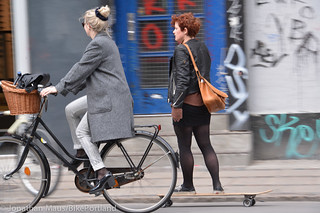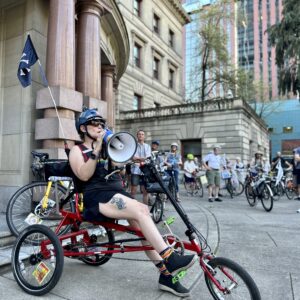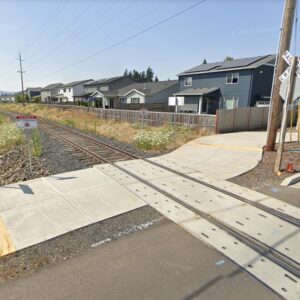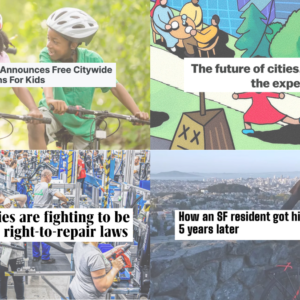Its users are belittled, harassed and ignored, but people keep doing it because it’s practical, affordable and fun — and Portland is leading the nation in thinking about it as a useful form of transportation.
It’s skateboarding, and the new episode of BikePortland’s half-hour monthly podcast asks whether it’s following in biking’s trail.
In celebration of OMSI’s new skateboarding exhibit and Portland’s increasingly sophisticated skateboard advocacy movement, we invited two smart advocates to join us and talk about the parallels between skating and biking and the future of skating in the first major U.S. city to make skateboards street legal (that’d be ours).
I especially like the part where each of us shares an example of something skateboarding can do that no other form of transportation can — and, as usual, the song producer Lillian Karabaic found to introduce our show.
Thanks to our guests, Cory Poole of the NW Skate Coalition and Tessa Walker, a Portland State University scholar whose study of skateboard transportation is available online. (She actually gave the wrong URL during our taping.)
You can subscribe to our monthly podcast with Stitcher or iTunes, subscribe by RSS, sign up to get an email notification each time we upload a new episode, or just listen to it above using Soundcloud.








Thanks for reading.
BikePortland has served this community with independent community journalism since 2005. We rely on subscriptions from readers like you to survive. Your financial support is vital in keeping this valuable resource alive and well.
Please subscribe today to strengthen and expand our work.
I’ve stopped biking the 1/2 mile to school with my 3rd grader and prefer to skateboard there. I get a lot of weird looks, but it’s very practical. He can bring his helmet & board into class with him, so it’s faster than locking/unlocking the bike at the rack, and I get to have a really fun ride back home afterwards.
It’s not use of skateboards as practical transportation that skateboarders are belittled, harassed and ignored. Longboards and other skateboards used as actual transportation, can work out alright, when in riding them on narrow sidewalks, skateboarders get off the board when people walking are present.
Some skateboarders use the bike lane for travel, which can work well when they’ve equipped themselves with lights and other visibility gear.
A big reason skateboarders are subject to contempt, is their long standing tradition of choosing to grind and jump skateboards on every conceivable wall, seat, hand rail with the resulting, costly, often irreversible damage that causes.
first its not Jumping and also its not choose and stuff.. its how you ride a board. GRIDING is part of street skating and its what we do.
As a serious skateboarder for at least 42 years now, I have to agree with WSBOB.
While it came as a clear result of a lack of facilities, I have never been down with destruction of public/ private property while skating.
I also recall using my skateboard as transportation since I was old enough to leave the neighborhood, which strangely then was right after I started skating. My brother has reminded me that we would be miles and miles from home, at a very young age, on our skateboards bombing hills…..
Destruction of public property? A bit of paint scuffed up here and there, some wheel marks on walls, handrails and ledges? Have a bit of perspective in regards to what real ‘destruction’ is, please…
Skuffed paint? You fully well know that grinding chips paint away to bare metal which rusts and opens the material to degradation. How about chipped marble? broken brick? broken bench boards? How about the grinding wax embedded into seat walls? Pete you think the designers and taxpayers who paid for nice stuff disregard this damage?
You want you fun, but at the expense of public spaces being able to use premium materials or graceful shapes. This attitude that “screw it” it is just a mark on somebody else’s stuff is exactly the reason that skateboarders have made themselves unwelcome
“Destruction of public property? A bit of paint scuffed up here and there, some wheel marks on walls, handrails and ledges? …” Pete
The big problem is common, extensive damage to concrete, brick and stonework, and also handrails. Scuffs and wheelmarks are just kind of annoying, a waste of someone else’s time, I suppose usually rather than skateboarders themselves, to clean it up.
Not to let this issue though, take away from the potential skateboards can offer as transportation. Living in Central Beaverton, I see skateboards being used quite a bit as transportation. All kinds, but for their stability, longer boards seem to work well (a downside is their being heavier, more awkward to carry around.). Some ride those dinky, cheap plastic skateboards that barely have room for both feet…crummy wheels…they just look dangerous, for everyone.
Last week before the snow, at night in a nearby neighborhood with few streetlights, a couple guys were riding wheels that light up when rolling. I was driving, and it was kind of amazing how the brightly colored lit up wheels were visible, some 200′ away or so as the guys s-curved back and forth across the sidewalk.
So you are okay with people destroying things so long as other people get to pay for it?
Some very interesting comments. It stresses the concept of public “use”. do people get upset when public infrastructure gets worn out though intended use? I think one of the issues here is the sense of unintended use. I certainly do not condone the inappropriate use of public or private property. But in many cases the facilities being “damaged” are already disused and in disrepair. I feel there may be a sense of damage is amplified by public conceptions of skate culture. There is also an opportunity to talk about the concept in integration of skate elements into public spaces. If every few blocks there was an inexpensive skate element built into existing infrastructure how would inappropriate use be affected?
Of course this is all a bit removed from the kind of skateboarding that is transportation focused. Most longboards are completely incapable riding rails or curbs.
It sounds as if you are condoning skateboarders diminishing the value of on public spaces if something is already worn. (“it was almost broken anyway”) And you quote “damage” as if chipped masonry or paint scraped to bare metal does not qualify as damage. Critics are prejudice of skater’s “culture”? Yup. Critics get their ideas are based on experience. Skate culture that condones, or rationalizes the damage to public spaces has earned and continues to earn its reputation. Sure middle aged long boarders who can no longer perform gravity defying tricks use their sticks as transportation, but when they watch their children grind a rail it is “DUDE you rock” as they perpetuate the culture that defines them as destructive.
You also request that skate facilities be built into public spaces as if their loud and frenetic acrobatics are welcome everywhere. In fact where public spaces are tranquil, and where children are present skateboard athletics are not compatible uses. Just because you have a wheeled toy does not mean that you can use it everywhere.
Without wanting to short-circuit this interesting discussion, I’d like to urge folks to apply the bikes/skateboards metaphor here and consider whether “skateboarders” is any more useful as a generalization than “cyclists” or “motorists” is … and also whether damage to infrastructure by people using skateboards is anything compared to the damage caused by people using cars, trucks or (indirectly) buses.
If cars and trucks were frolicking in parks and plazas and damaging taxpayer’s stuff (which they sometimes do) it would be considered in the same light, as criminal vandalism. For cars and trucks to damage roadways, for which they were designed and to which they are designated, is a red herring in this discussion.
except for designated skate areas, benches, rails, paint and masonry are not designed for skateboards to ride upon.
How is it inappropriate to use the term skateboarder when describing a person who rides a skateboard when discussing the impact of riding skateboards? I am not discussing skateboarders and hygiene or skateboarders and shoplifting where there is no connection. Are the PC police looking for infractions?
Granpa (and wsbob below), I agree that damaging roadways by using them for transportation is a very different issue than damaging railings for fun. My intended point is that both require public money, but one of them costs money on a far larger scale than the other. If making a city more skate-friendly means 5% more railing maintenance but 0.003% less road maintenance, we’d all save lots of money.
On language, I don’t mean to say it’s inaccurate to call skateboarders “skateboarders,” I mean to say that there are many different kinds of skateboarders and it doesn’t make sense to me that “skateboarders” would have made themselves unwelcome, as you put it, because some of them damage railings. I don’t think that’s any different than saying bikes are unwelcome in a city because some people who ride them recklessly endanger people on foot.
I think damaging railings is bad, I think making a city friendly to skateboard transportation is good, and I think they’re two separate issues.
Michael…it’s you that referred to people riding skateboards as being “…belittled, harassed and ignored, ….”.
It seemed to me you were referring exclusively to people using skateboards for practical, fun transportation, rather than those using boards to trick skate off of, and damage in the process, a huge range of public and private things like hand rails, steps, and so on.
At any rate, I thought I made it fairly clear, here:
http://bikeportland.org/2014/02/11/new-podcast-episode-bikes-and-the-future-of-skateboarding-101226#comment-4491629
…that I don’t think this is happening much to people using skateboards for the purpose of fun, practical transportation.
Maybe for readers here, you could summarize some of the ideas for making Portland more friendly to skateboarding as fun, practical transportation, that may have been brought out in the podcast.
OK, wsbob, that’s fair. One example mentioned by Cory in the podcast, which will be familiar to many people who’ve ridden bikes vehicularly in other cities, was being stopped by a police officer while he waited to make (IIRC) a left turn using a left turn lane. Less benignly, he mentions police treatment in Salem of (IIRC) a young Latino man who was using his skateboard on the street.
Tessa and Cory also mention issues like pavement quality and “skate spots” that sprinkle non-destructive recreational skating opportunities through a city rather than making skate parks purely destination-based.
If the example Cory offered, was of someone on a skateboard in the left turn lane, waiting to turn, that’s an interesting travel mode traffic situation, worthy of some discussion.
As for pavement quality that doesn’t work well for skateboarding…going back some years, I’ve had a feeling which I was never able to confirm from a number people I talked with informally, that some sidewalks have been deliberately built with extra wide and deep expansion joints, in part to either discourage skateboarding on them, or at the least, slow down the speed traveled.
Not as bad for bike travel, I suppose, but the extra deep and wide expansion joints, also create a rougher ride for bike travel. Sunset Hwy MUP is an example.
I don’t think there are many people who use skateboard as real transportation who haven’t been stopped by police for doing nothing dangerous or illegal. With younger riders the stops often seem like a pretext to search backpacks. I have been stopped before my left turn experience. When this has happened police are generally not interested in being educated in the portland skate law. I do sympathise with the police. For the most part they have not been trained about skateboard use on the streets. We are trying to change that.
“…and also whether damage to infrastructure by people using skateboards is anything compared to the damage caused by people using cars, trucks or (indirectly) buses.” andersen/bikeportland
Michael…c’mon…it’s not the street that some skateboarders, or, as you’re suggesting… “bikes/skateboards” …have brought extensive damage to.
Damaged through bad use of skateboards, are things such as hand rails, benches, stairs, border walls, building architectural moldings and more, whose function is not designed at all for travel purposes, as are roads and, bike lanes, MUP’s and sidewalks.
In order of appearance:
I quote the word damage because it is relative in this case. Much of the damage attributed to skateboarding is equally attributable to normal (non skate use).
I specifically said I do NOT condone the inappropriate use of public or private spaces for any use. Masonry and paint gets chiped without the help of skateboards. I could point out many metal handrails around portland in terrible shape where skateboards have no access.
While some skateboarders have no problem with damage to property I would not say that attitude is common in the greater skateboarding community. I could easily point to the damage that BMX riders do when they peg surfaces doing tricks but I would not put attribute their behavior to the bicycling community as a whole.
I was NEVER able to perform gravity defying tricks. I DO tell my five year old that she rocks, because she does.
The noise associated with skateboarding is a potentially valid concern. While longboards use soft wheels and make little noise, the pop sound of shortboard tricks can carry. I would encourage you to stand on any sidewalk and pay attention to the noise levels of various modes. Trucks, motorcycles and many cars are louder than most skateboards.
I find your comment regarding children’s safety very concerning. Are you suggesting that children are somehow endangered by the presence of skateboards? I would encourage you to visit any suburban skatepark around Portland they are typically filled with little kids often on scooters and other wheeled devices that make it difficult for skateboarders to use the park. Yet I have rarely seen skateboarders react poorly to kids. I have even watched a experienced skateboarder slam himself into a wall to avoid a child that was riding a bicycle in the skatepark inappropriately. Children are drawn to skateboarding as a fun activity that is stimulating and challenging in a world of childhood obesity we should be encouraging our kids to participate in ANY active pastime they show an interest in.
Regarding the Wheeled toy comment. I would remind you that many people consider bicycles to be wheeled toys. I see both as transportation.
It sounds like you have had some negative experiences with skateboarding. I would love to meet with you sometime to talk about this in more detail.
Thanks for your thoughtful reply. I am a designer and my designs get compromised, or I am not able to design a certain way because I know inappropriate use will damage it. Back in the day, before polyurethane wheels, I rode skateboard and ground the material down to the metal core.
I know most people who ride are just folk who want to go along and get along.
Scooters (two urethane wheels and handlebar) have long been used as alternative transportation in urban areas. Far easier to ride than a skateboard, most have brakes, and they fold up.
Agreed, We also advocate for the use of scooters. There are even high quality adult scooters which can be very practical transportation. I just like skateboarding better! 🙂
Scooters are like bikes with training wheels.
Many times, when we love what we do so much, it becomes easy to gloss over what we leave behind, and why. From bolts in rock, to spray paint on a wall, to grooves along marble ledges, and yes, skid marks on dirt trails, we may think this is part of what we do, so it is fine. (not pointing fingers, just examples)
Well it is not fine, and we need to get past such thought processes.
Damage to public and private property dug the hole that skateboarding is finally pulling it’s beautiful locks out of.
Referring to it in this reference, next to an article about a resurgence of skateboarding, even as transportation, is entirely relevant.
Skateboards can be a great transportation method for short distances! I don’t think encouraging this has any effect on damage to public property. The vast majority of us are nowhere near talented (or gutsy) enough to practice the kind of tricks skaters everywhere are going to do regardless of what anyone says or cares about. I think making room for everyone else to expand the options beyond driving is a great way to condone a healthier/more active lifestyle and activate public spaces.
i totaly agree
More long-range electronic longboards are on their way.
http://e-go.com/
http://www.boostedboards.com/
Probably not on their way to Portland, most all electric skateboards currently on the market are not designed for riding in the rain/through puddles…if you find one though then let me know, I looked.
I’d rather see skateboard damage on every visible surface than have to look at cars everywhere all the time. Disclaimer: I don’t ride a skateboard or drive a car.
Skate boards are just fine in the bike lane as long as they only have two wheels on them.
how are skateboards supposed to have 2 weels on them?